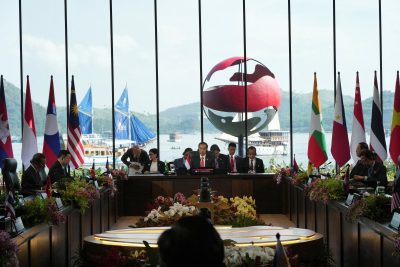Against a backdrop of heightening competition between the United States and China, Southeast Asia has come under greater scrutiny as analysts examine where ASEAN states stand in this power rivalry.
With its history of managing intramural conflicts and as the pioneer of multilateral institutions in the Asia Pacific, there is growing interest in ASEAN’s preference for active neutrality in managing the regional order. For analysts and policymakers in Southeast Asia, development imperatives trump bandwagoning and containment.
Some observers may find this stance unrealistic given the close bilateral relationships that certain Southeast Asian states have with the United States and China. But what is often missed are the development and security imperatives of these states.
For Southeast Asia, development is security — an ideology that has prevailed since the postcolonial period until today. This thinking has translated to ASEAN’s notion of comprehensive security, which goes beyond concern for military threats to include political, economic and sociocultural issues. Most states in Southeast Asia have always put a premium on developmental issues, particularly now given the uncertainties in the global environment.
With troubled relations between the United States and China and threats to multilateral cooperation, it is important for Southeast Asia to reclaim the concept of comprehensive security and promote cooperative security. These are critical frameworks in crafting responsive policies to address the complex and cross-cutting challenges facing Asia and the rest of the world.
Comprehensive security has a long history in Southeast Asia. It was a key concept developed by ASEAN states in the late 1970s and early 1980s to inform responses to the challenges facing the region. To ASEAN countries, economic stability is fundamental to regime legitimacy and security. Comprehensive security paid close attention to economic problems, but also included important political issues affecting stability and regime survival.
In the mid-1990s, the emergence of the concept of human security introduced a focus on threats to individuals and communities, such as environmental degradation, food security and health. These issues have now been integrated into Southeast Asia’s notion of comprehensive security and remain important contributions to security thinking and practices within and outside Asia.
As the number of security challenges continued to grow, comprehensive security became even more important given the transnational impacts of these challenges. In the post-COVID environment, the global economic crisis and climate change-related issues like food security have become even more consequential to the wellbeing of Southeast Asia.
Indonesia, Myanmar, the Philippines and Vietnam are among the most vulnerable countries to climate change. The economic costs from these natural hazards are currently estimated to be US$780 billion and are projected to increase to US$1.1–1.4 trillion under worst-case scenarios.
The failure to institute mitigation and adaptation measures early, particularly for less-developed states in the region, has serious implications for human security. This has become more critical after the pandemic inflicted a severe blow to the global economy. The International Monetary Fund’s recent economic outlook warned of a ‘rocky road ahead’, with the lowest five-year growth projection since 1990 of 3 per cent per annum. While the growing economic risks are attributed to many factors — including the war in Ukraine — these have a multiplier impact on human security, worsening job security and rising food prices.
While the growing complexity of security challenges calls for deeper and more robust multilateral cooperation, there is growing fragmentation. Widening inequality, forced human displacement and alienation have led to an erosion of trust in institutions at all levels, from the national to the global. This is compounded by misinformation and disinformation. People’s lived experiences during the COVID-19 pandemic have shown how institutions failed to prepare states and societies to deal with 21st century transnational challenges.
With these daunting challenges, there are compelling reasons for Southeast Asia to reclaim comprehensive and cooperative security. This requires ASEAN to demonstrate their ability to push ahead with the slew of regional cooperation programmes outlined in the three ASEAN communities — political, economic and sociocultural.
Urgent agendas include expediting the integration of ASEAN economies and narrowing the development gap among its members. Also critical is helping communities deal with the impacts of climate change, building societal resilience, preparing for future pandemics and addressing transnational crimes like human trafficking and cybersecurity.
It is critical for ASEAN to continue championing comprehensive security to help its members cope in addressing increasingly complex internal and regional problems. They should deepen cooperation with their dialogue partners through the ASEAN Plus Three and East Asia Summit frameworks.
Small- and medium-sized countries in Southeast Asia should focus on working together to advance cooperative security instead of resorting to exclusive security arrangements like the QUAD and AUKUS, which tend to fuel fragmentation. Southeast Asia should once again exercise their agency and actively take the lead in advancing multilateralism in Asia.
Source : EastAsiaForum


